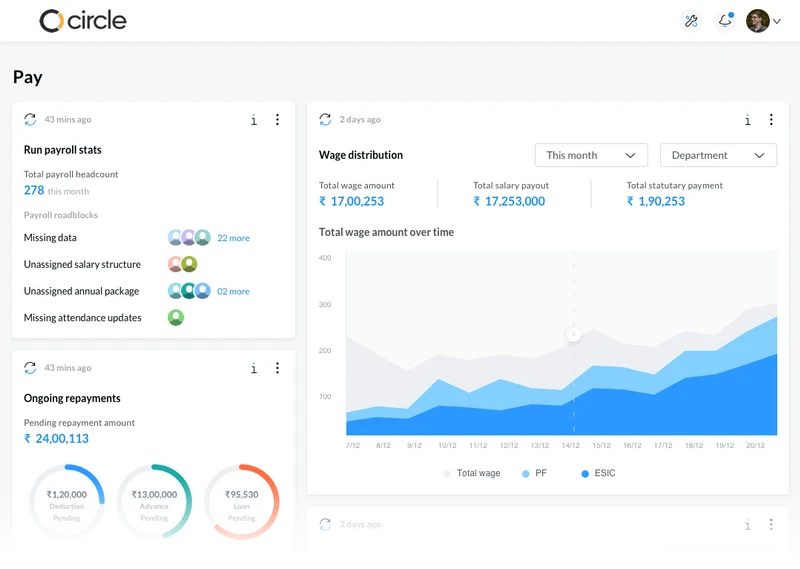Employee payroll processing is an important, ongoing human resource management procedure for business owners. It entails calculating, managing, and paying employees’ salaries, wages, bonuses, and other types of remuneration. The payroll process is a complicated one that necessitates precise calculations and timely payments to comply with local rules and regulations and is more than just signing the pay cheques. Therefore, payroll management should always be optimised and in sync to avoid legal repercussions.
An efficient payroll management system assists firms in core HR tasks like budgeting and financial planning. Businesses may better comprehend their financial records and plan for future spending by precisely recording employee compensation and benefits. This can assist firms in avoiding cash flow concerns and ensure they have the finances to pay their employees on time. Furthermore, payroll reports may give useful insights into business performance, helping companies make educated decisions and elevate their financial situation.
Why Is Automation Required for Streamlining Your Employee Payroll Process?
Payroll computation is an important procedure that includes calculating tax deductions, salary withholdings, and employee pay. Human errors in payroll computation can result in financial losses and legal difficulties. Therefore, businesses must have a dependable and accurate payroll system.
Automating your employee payroll process is critical for guaranteeing accuracy, efficiency, and compliance, streamlining the entire process. Automated payroll management software can help you save time, reduce mistakes, and comply with regulatory laws. With payroll automation software, you can conduct payroll quickly and easily without entering data or manually computing taxes.
Furthermore, online payroll systems provide you with access to thorough payroll reports that may assist you in making educated decisions about how to manage your employees’ paychecks. By automating your employee payroll process, you can assure accuracy and compliance with payroll policies while freeing up time for other duties.
Payroll Management Best Practices for Your Employees
Organisations must manage employee payrolls to ensure they are paid accurately and on time, and precise records of all salary payments must be kept. Effective operations entail drafting regulations, updating records, and adhering to local norms and regulations.
On-time compensation improves employee morale and satisfaction, which leads to increased production levels and superior business outcomes. It may also help the company’s reputation and attract new consumers or clients that respect ethical and compliant business practices.
Let’s go through some payroll processing suggestions for HR managers in India.
- Using an Automated Payroll System
One of the most effective methods to increase the efficiency of your payroll process is automation, such as employing software to compute and manage payroll, creating direct deposits for employees, and using electronic time-tracking systems. An efficient payroll management process can streamline and minimise the payroll team’s workload.
Payroll management solutions can precisely address all aspects of payroll, including pay calculation, computing taxes, deductions, and other benefits, and filing employee returns. Automation saves time, avoids mistakes, and assures reduced payroll costs and increased payroll compliance, thus ensuring business success. To reap these benefits, consider investing in payroll software or payroll outsourcing from a dedicated payroll provider.
2. Maintaining Correct Records
Maintaining precise records of employee hours worked, pay received, leave balances, and taxes withheld is the core of payroll management. Using reputable payroll software can assist in automating record-keeping and lowering the chance of human mistakes.
Along with maintaining employee records, payroll staff should ensure that all information is updated regularly. Before processing the paycheck, HR managers should verify employee data such as attendance, leaves, and other pertinent information. Verifying the data can help avoid payroll calculation problems.
3. Ensuring Labour Law Compliance
HR managers must be informed of Indian labour laws like minimum salaries, working hours, overtime standards, and other labour-related concerns governed by Indian labour laws. HR must also remain updated on central and state tax rules. Non-compliance with these regulations may result in significant penalties and legal troubles.
4. Developing Clear Payroll Policies
Human resource managers should develop clear payroll policies detailing the payroll calculation and processing procedure. Clear procedures can help reduce employee misunderstanding and guarantee that payroll is done correctly.
4. Maintaining Open Communication Lines
Employee communication is essential for good payroll administration. HR managers should maintain open communication channels with employees about payroll processing. Employees should be educated on salary components, taxes, deductions, and other perks. Ensure that payroll regulations and processes, such as pay intervals, rates, and deductions or perks, are well communicated.
Allow employees access to their pay stubs and other pertinent information, and be accessible to address any questions or issues. HR managers should also respond quickly to employee payroll questions. Further, regularly discuss any modifications or adjustments to payroll operations to preserve openness and minimise confusion.
5. Conducting Frequent Audits
HR managers should regularly audit the payroll processing system to uncover problems and irregularities. Regular audits can assist in determining the root cause of problems and adopting remedial actions. Anonymous employee feedback can also help identify and resolve internal process issues.
6. Keeping Room for Direct Deposits
Employees who do not have access to traditional banking services may find other payment solutions, such as payment cards, UPI (unified payments interface), or mobile payments, more convenient. Ensure that the availability of these alternatives is properly communicated to staff and that necessary training or assistance is provided.
What to Look for When Purchasing Payroll Software
Buying payroll software may be difficult, especially if you are unfamiliar with the capabilities, prices, technology, and options. Here are the top features to look for when selecting payroll software to assist you in making an informed selection. These features will streamline essential business functions from tax compliance to employee self-service.
7. Tax Compliance and Reporting
Tax compliance and reporting are two of the most important things to consider when selecting payroll software. The software should be able to perform these complicated tasks. It must have integrated tax-reporting features to avoid errors in deducting federal, state, and local taxes. To prevent penalties or fines, update the software with the most recent statutory payment details.
8. Employee Self-Service
Another crucial element to consider while selecting payroll software is employee self-service. This implies that crucial employee details such as pay stubs and tax forms are accessible by employees themselves without requesting the HR or payroll administrators.
8. Attendance Software
Payroll software must function as an attendance management portal to precisely record employee hours worked, including overtime and time off.
9. A Collaborative Platform
Look for software that integrates with other systems to save time and money by eliminating countless hours handling different software systems for different admin procedures.
9. Customisation and Adaptability
Payroll software needs to be flexible enough to meet the needs of each employee. Moreover, some features might not be necessary for your organisation. Thus, you should be able to personalise the platform to fit your organisation’s needs.
Wrapping Up
Payroll operations must be optimised to ensure accuracy and eliminate errors, which can otherwise lead to costly fines or dissatisfied employees. Furthermore, automating HR procedures may save your human resource management significant time to devote to more strategic objectives like employee development and engagement. Automation reduces mistakes, increases HR procedure productivity, and ensures compliance with legal requirements and security.
sumHR offers cloud-based payroll management solutions that help streamline business operations like managing employee data, attendance, leave, and payroll processing. We also deliver customisable reports and analytics without any compliance risk. Ready to streamline your HR procedures?








